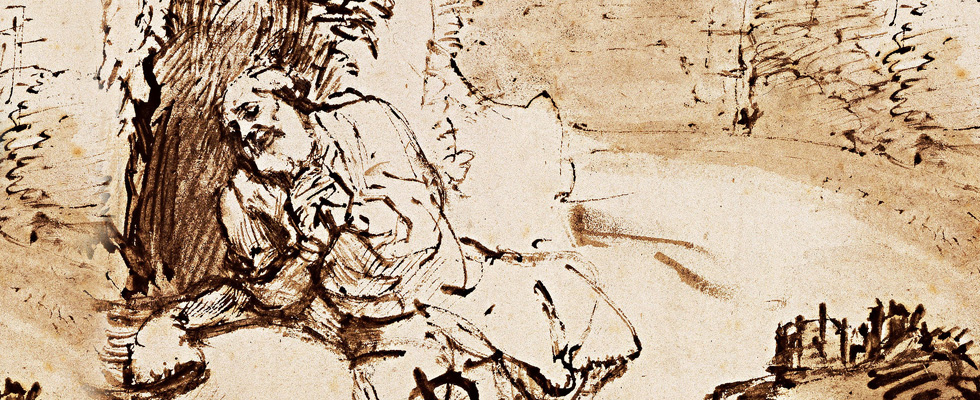God has been gracious to Nineveh and to Jonah – sending Jonah to the pagan city, chasing the disobedient prophet across the Mediterranean, preserving him in the great fish, and finally using him to reach the Ninevites. In many ways we could expect the book to finish at the end of chapter 3 – the king of Nineveh is walking about in sackcloth, and the people have turned from their wicked ways. Maybe a little prayer of thanksgiving would have been a nice way to finish the book. Instead we get one major temper tantrum from one cantankerous minor prophet. God is not satisfied with partial obedience; there are no half-measures with Him.
The sin of complaining against God
Jonah was exceedingly angry at Nineveh’s repentance! And he complained that God was gracious, and finished off his dummy spit by calling on God to take his life (4:1-3). This is not some mild expression of discontent. Jonah is in full cry here. He is vehement, he is fierce, he is absolutely furious. He is like Elijah – so downcast and out of sorts that he wishes to die (1 Kings 19:4). And he is fierce not against the law of God but the grace of God. He accuses God of goodness! Jonah knows what God had said about His own character in speaking to Moses (Exodus 34:6-7). Some people get bitter at their lack of success – perhaps they were overlooked for a promotion or some achievement they were proud of was not appreciated as they thought it should have been. But Jonah is angry precisely because God blessed the preaching of His word. Some object to God’s justice but Jonah objects to God’s lovingkindness.
Israel had received mercy, but Jonah wanted it to remain with Israel, and not to go to the Gentiles, especially not the barbaric Assyrians. Jerome tries to put Jonah’s outburst in its most favourable light: ‘He is not saddened, as some think, by the salvation of pagan multitudes, but fears that Israel would perish.’ Perhaps so, but Jonah’s thinking is all distorted. Jonah had forgotten his Bible, forgotten the storm, the lots and the great calm, forgotten his repentance in the belly of the great fish, and now he is at loggerheads with God again. Does he not remind you of the elder brother in the parable of the prodigal son? (Luke 15:28-30) The Pharisee is never far from the true believer – full of self-pity and self-righteous petulance.
Is God holy? Yes. Is He just? Yes. Does He punish the guilty? Yes. But He delights in mercy, and that is precisely what Jonah is complaining about. God is both just and gracious, and that is especially seen at Calvary. Christ satisfies the justice of God, and wins mercy for all who repent of sin and believe in Him. Jonah has lost sight of all that, and he is thinking: ‘I am better than these Ninevites. God should punish them because they deserve it.’ How wrong can you be! We approach a throne of grace. Lose sight of grace and you become ungracious.
God rebukes His peevish servant
God had rebuked Jonah in chapter 1 by the circumstances (the storm, the lots) and verbally (by the heathen sailors). Now in chapter 4 God has do it all again. We ought to be grateful that He is slow to anger. First, God rebukes Jonah verbally: ‘Do you do well to be angry?’ (4:4). What response does God get? None! (4:5) Jonah cannot answer so he does not answer. Early in the American Civil War of 1861-1865, people would sometimes come with their picnic baskets to watch the fighting. That is Jonah – sitting under a little shelter, hoping against hope that God would send a thunderbolt and really give it to those Ninevites.
Surely Jonah’s conscience was pricked but he was determined to ignore the question. So God turns to circumstances again (4:6). This plant did not just grow up. God prepared it. Some say this plant was a cucumber, the KJV calls it a gourd, the NIV has ‘vine’, but the Jerusalem Bible’s suggestion that it was a castor-oil plant is very appropriate! Whatever it was, it provided shade, and Jonah was very attached to it. For the first time in a while he is very happy. But he is thoroughly selfish happiness.
So God sent a worm which destroys the plant (4:7). Things went from bad to worse, and Jonah gets sunstroke (4:8). God’s sovereignty is total – over the dice (1:7) and the worm (4:7). It is Jesus who tells us that the hairs of our head are numbered, and not one sparrow falls to the ground apart from our heavenly Father’s will (Matt.10:29-30). The Lord is chastening His rebellious servant. In some Muslim countries the punishment for a crime committed while a scorching east wind is blowing may be reduced. Jonah was exceedingly uncomfortable, and preferred death to life.
God then returns to the verbal rebukes, but Jonah remains a stubborn coot (4:9). God is now prepared to give it to him straight.
People matter more than plants
This issue is raised in the last two verses (4:10-11). Jonah has become so centred on himself, so full of bitterness and self-pity that his values have become distorted. Jonah has had more pity for this ephemeral ‘son of a night’, a plant here today and gone tomorrow, and has no concern for the immortal souls of his fellow human beings. Remember Shylock’s speech in The Merchant of Venice?:
Hath not a Jew eyes? Hath not a Jew hands, organs, dimensions, sense, affections, passions, fed with the same food, hurt with the same weapons, subject to the same diseases, healed by the same means, warmed and cooled by the same winter and summer, as a Christian is? If you prick us, do we not bleed? If you tickle us, do we not laugh? If you poison us, do we not die?
People go nutty over all sorts of transient things – their pets, their clothes, their sport, gardening, anything. And they forget that they rub shoulders with people who will spend eternity in heaven or in hell. There is a distortion of values. I used to live near a fellow who had a sticker on his car: Whaling is murder. Murder? What about abortion, the deliberate killing of unborn children?
Jonah watered his little plant, talked to it, and kissed it goodnight, all the time waiting for God to send fire and brimstone on Nineveh. So God says: ‘If you, Jonah, are so filled with pity for this plant, should I not pity Nineveh with its population of 120,000, who have been created in My image? Where are your values, Jonah?’ God is compassionate (Ezek.33:11; Matt.9:36; Luke 15:10).
Better to fall into the hands of the living God into Jonah’s hands. How did Jonah accept this rebuke? The book does not directly answer that question. Instead, God finishes the book with a question about God’s compassion for sinful human beings. But I think that we can assume that Jonah went home with a job to do – to write his autobiography, which tells of God’s love for the lost, and His desire for our sanctification.




















